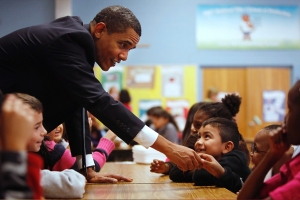
Got asked in Belvoir this last week about the present situation in US and what must be done. I answered by citing my own household economy as microcosm:
- Far more competitive world means earning potential is harder to achieve;
- That income "haircut" means past debt patterns unsustainable, thus the deleveraging that continues (done better by individuals, families, firms, everybody but the Fed Gov!);
- Housing is key (our move to short sale old house was big financial achievement of 2011), and curing that is key to allowing workers to move (that's why we did it this year, while the right constellation of circumstances presented themselves, in preparation for eventual 2014 move back East for job-related purposes);
- Education is key (I pay 7 tuitions: 2 preschool, 2 grade school, 1 HS, 1 undergrad and 1 grad) to maintaining future possibilites, so investment trumps damn near everything; and yet,
- Healthcare is huge drain (I pay my own now and the pre-tax cost, by my estimate, is between $30-40,000, meaning that's how I gotta earn to cover it all from stem to stern).
So larger reality for US not unlike my family: we had to scale back everything to preserve what matters, which is healthcare and education; we had to solve the housing situation to allow for renewed labor mobility; we haven't really seen our standard of living go down at all, and yet we've made wrenching changes to be able to live on a much smaller consumption footprint. All tough adjustments, but incredibly worthwhile.
But again, healthcare is huge and seemingly unassailable from my perspective. We are exceedingly careful about how we spend those dollars, even as that's the last thing - besides education - that we want to scrimp on.
Of course, if we don't have six kids, then my life is dramatically simpler on all scales, but there again, what keeps America strong? Demographics, so that's worthwhile too.
Citation here is Alan Blinder op-ed in WSJ. Great stuff.
"Four deficit myths":
- Americans now demand deficit reduction like never before. Not true. Jobs matter far more now, as does healthcare and housing. Just understand, polls on this subject are no more definitive than they were 20-30 years ago. This is not our current obsession.
- Our deficit is so bad right now that massive cuts are required immediately. Also not true. We have no trouble selling debt in this global economy. Yes, long-term deficit issue is acute, but key is setting in place conditions for long boom that takes care of that. See Europe for austerity approach.
- The ten-year reduction focus makes sense. Bad thinking. Little can and will be accomplished in any 10-year plan. The problem if far longer in scope - see demographics, and thus the solutions must be similarly gauged.
- America has a generalized problem of runaway spending. Very untrue. The only part of the Fed budget that's really exploding is Medicare and Medicaid, so it's still mostly about healthcare.
In short, "we have a humungous healthcare problem."
Anybody familiar with the US defense budget has long said the same thing: we don't have operations or acquisition or training or personnel crises. The "imperial overstretch" argument remains complete academic bullshit. We primarily have a healthcare crisis that is extended into pension system. Everything else pales.
In my family right now, the biggest short-term threat, now that we're mortgage free and successfully deleveraging across the board, is healthcare. Huge drain. Big uncertainty. Encourages self-defeating avoidance behavior on many levels (which we try desperately to be smart about). Leaks into everything.
When GOP says Obama went off deep end on healthcare because country didn't want that or didn't elect him for that, they miss the mark. It is clearly the biggest internal challenge we face - short and long term. It is the hidden villain on everything. Saying it was a diversion is - itself - a diversionary election-centric tactic.
But still, I would trust a Romney to finesse its implementation better than an Obama, whose political and negotiating skills I no longer respect, and whose stunning ignorance of, and antipathy toward, business has become an unacceptable leadership flaw - given the tough adjustments still to come.
And yes, I LOVE that Romney did it first in Massachusetts - and did it intelligently. That is a huge credentializer in my mind.
Americans' distrust and anger toward globalization and big business is stunningly misplaced. Globalization has made the world so much better, but it now challenges us in ways we've long gotten used to avoiding because of our long-term privileged position in the global economy, which itself reflected gross historical injustices stemming from colonialization, WWII, socialism in the East, etc. None of those things were our fault, and we took the lead in overcoming them all, but we did live in a pretend world of superiority on that basis across the second half of the 20th century.
That world is gone, and good riddance, say I, because it was supremely unfair to the majority of the planet, and I don't want to live in this world by exploiting others unnecessarily.
So our succees in spreading American-style globalization now comes back to haunt us, demanding we adjust. That's not about demonizing business, even as it is about cleaning up some incredibly bad form on Wall Street (a regular task, just bigger this cycle). It's also not about demonizing China, who is our biggest ally in the global economy going forward - like it or not.
Romeny will say stupid things on China to win the GOP nomination. Obama is already doing stupid things. On the business, it's clear who's hostile and who's not.
Looking ahead, I want a dealmaker, a difference-splitter, a realist on business who acts based on experience and not sterile theory. I also want somebody who can rationalize our military budget and global presence without resorting to idiotic, default targeting of the Chinese.
Romney is far from ideal on all those scores, but he does beat Obama, in my mind, on every one of them.
I stil maintain Obama was the best choice of the two in 2008. I would still vote for him all over again, given the repeated chance. I do think America, however, would have been much better served by a Hillary presidency (I voted for her in the primary), and since I can't get that this time around, I'll make do with the alternative, who I think will have a far better chance of working with a Republican House and Senate than Obama will - given overall Boomer political proclivities (most Boomer politicians are just above cartoon-grade in their motivations, skills and intelligence).
No, I would take Obama over the two jokers (Santorum and Paul) and the complete wild card (Gingrich). And yes, this would be my first vote for a GOP presidential candidate in my entire life.
And my logic on all this if decidedly unemotional (can I toss in that I'm the father of two African-come-to-America daughters, just to be safe?).
This isn't personal in the least; this is strictly business.
LATER ADDENDUM DUE TO MIKE RUSSELL'S COMMENT ABOUT GOP'S CHARGE THAT OBAMA IS "ANTI-BUSINESS":
I don't use that political term of art (anti-business), because I don't think it's true. I don't think his policies have been particularly anti-business.
I think he doesn't understand business (ignorance) and on that basis tends to vilify and scapegoat business (antipathy) for our continuing poor recovery. The silliness over "taxing millionaires and billionaires" is, to me, just rhetorical nonsense. Those people pay plenty, but no matter how much more we tax them (I am indifferent on the subject), it won't change our fundamental issues. So, to me, rolling with political gamesmanship like that says serious change isn't what he's looking for, otherwise he would have gone with Bowles-Simpson and not ignored what everyone said were sound recommendations.
I also cite the ignorance issue for what I consider to be generally bad-for-business-but-bad-for-everybody-else-too policies in combating the crisis. The administration just hasn't done enough to encourage deleveraging throughout the economy, instead preferring stimulus spending to cure a financially-driven overhang crisis, which, per Rogoff, is the wrong medicine chasing the wrong disease.
I won't claim to have tracked the US economy enough to have said, I told you so way back when, because I most certainly did not. But it's hard for me to accept that a guy as smart as Obama couldn't find enough people around him who were smart enough to realize that stimulus splurging after a financial crisis only gets you a follow-on fiscal crisis without actually improving the financial hang-over/debt overhang. They still don't seem to get that, and as long as they don't, I think business will hold off on investment and hiring because consumers are forced to keep their spending low (I certainly am).
So all I am left assuming is that he doesn't know business (ignorance) and made patently bad choices out of some antipathy to business (it is hard to advise the guy who's certain he's always the smartest guy in the room). I say that because business has largely argued for a far stronger deleveraging focus versus the path Obama has taken. That path did include bailouts for Wall Street firms (not sure history will be kind there) and Detroit (am certain history will be kind there and have said that throughout in posts and speeches - but there I cite the global car industry, which is something I have tracked).
Finally, if Obama were both smart on business and less into his business-can't-be-trusted mode, I think he would have pursued opening up the US economy to Chinese investment instead of staying stuck on the RMB's value and this bizarre strategic "pivot" to East Asia, where apparently our weaponry and national "will" is going to keep us economically engaged in the region despite openly targeting the biggest economy there, a country, by the way, that we expect to finance this military buildup in the Pacific. But that's just me saying I don't trust how he views or understands global business.
In general, I do think Obama is a smart guy, but he's displayed enough dumb/antipathy WRT business for me to want him swapped out versus keeping him another four years. The global economy right now is in fairly precarious shape, and I don't see his administration being able to work with a GOP congress over the next four years any better than he has the past 3. We can say it's all GOP hostility but Bill Clinton managed that, and Reagan did with the Dems. Obama is just not that guy. He matches the GOP's Manichean view with too much of his own, along with a pride and self-confidence in his supreme intelligence that I think is his biggest weakness.
We've have world-class brain presidents (Hoover, Carter, Obama) and they manage to have attract hard economic times. I have come to greatly prefer emotionally intelligent presidents (FDR, Reagan, Clinton) or incredible dealmakers (Johnson, Nixon). That's why I will take Romney and his blandness and his difference splitting and flip-flopping and non-agenda. I want a manager who moves the process along for the next four years, rather than the perceived/actual ideologue who attracts more fight than he's worth and isn't clever enough to realize when he needs to bend instead of stand proud.
 Monday, January 21, 2013 at 10:03AM
Monday, January 21, 2013 at 10:03AM  China,
China,  democracy,
democracy,  demographics,
demographics,  education | in
education | in  Citation Post |
Citation Post |  Email Article |
Email Article |  Permalink |
Permalink |  Print Article
Print Article 



















